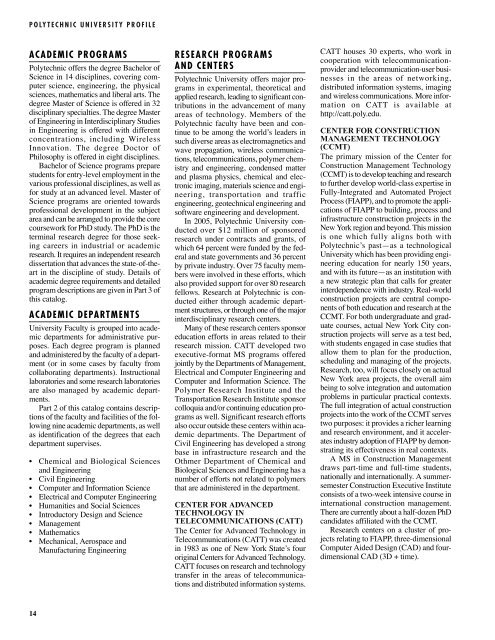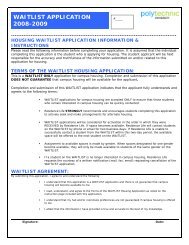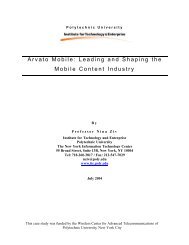POLYTECHNIC UNIVERSITY 2005-2007
POLYTECHNIC UNIVERSITY 2005-2007
POLYTECHNIC UNIVERSITY 2005-2007
Create successful ePaper yourself
Turn your PDF publications into a flip-book with our unique Google optimized e-Paper software.
<strong>POLYTECHNIC</strong> <strong>UNIVERSITY</strong> PROFILE<br />
ACADEMIC PROGRAMS<br />
Polytechnic offers the degree Bachelor of<br />
Science in 14 disciplines, covering computer<br />
science, engineering, the physical<br />
sciences, mathematics and liberal arts. The<br />
degree Master of Science is offered in 32<br />
disciplinary specialties. The degree Master<br />
of Engineering in Interdisciplinary Studies<br />
in Engineering is offered with different<br />
concentrations, including Wireless<br />
Innovation. The degree Doctor of<br />
Philosophy is offered in eight disciplines.<br />
Bachelor of Science programs prepare<br />
students for entry-level employment in the<br />
various professional disciplines, as well as<br />
for study at an advanced level. Master of<br />
Science programs are oriented towards<br />
professional development in the subject<br />
area and can be arranged to provide the core<br />
coursework for PhD study. The PhD is the<br />
terminal research degree for those seeking<br />
careers in industrial or academic<br />
research. It requires an independent research<br />
dissertation that advances the state-of-theart<br />
in the discipline of study. Details of<br />
academic degree requirements and detailed<br />
program descriptions are given in Part 3 of<br />
this catalog.<br />
ACADEMIC DEPARTMENTS<br />
University Faculty is grouped into academic<br />
departments for administrative purposes.<br />
Each degree program is planned<br />
and administered by the faculty of a department<br />
(or in some cases by faculty from<br />
collaborating departments). Instructional<br />
laboratories and some research laboratories<br />
are also managed by academic departments.<br />
Part 2 of this catalog contains descriptions<br />
of the faculty and facilities of the following<br />
nine academic departments, as well<br />
as identification of the degrees that each<br />
department supervises.<br />
• Chemical and Biological Sciences<br />
and Engineering<br />
• Civil Engineering<br />
• Computer and Information Science<br />
• Electrical and Computer Engineering<br />
• Humanities and Social Sciences<br />
• Introductory Design and Science<br />
• Management<br />
• Mathematics<br />
• Mechanical, Aerospace and<br />
Manufacturing Engineering<br />
RESEARCH PROGRAMS<br />
AND CENTERS<br />
Polytechnic University offers major programs<br />
in experimental, theoretical and<br />
applied research, leading to significant contributions<br />
in the advancement of many<br />
areas of technology. Members of the<br />
Polytechnic faculty have been and continue<br />
to be among the world’s leaders in<br />
such diverse areas as electromagnetics and<br />
wave propagation, wireless communications,<br />
telecommunications, polymer chemistry<br />
and engineering, condensed matter<br />
and plasma physics, chemical and electronic<br />
imaging, materials science and engineering,<br />
transportation and traffic<br />
engineering, geotechnical engineering and<br />
software engineering and development.<br />
In <strong>2005</strong>, Polytechnic University conducted<br />
over $12 million of sponsored<br />
research under contracts and grants, of<br />
which 64 percent were funded by the federal<br />
and state governments and 36 percent<br />
by private industry. Over 75 faculty members<br />
were involved in these efforts, which<br />
also provided support for over 80 research<br />
fellows. Research at Polytechnic is conducted<br />
either through academic department<br />
structures, or through one of the major<br />
interdisciplinary research centers.<br />
Many of these research centers sponsor<br />
education efforts in areas related to their<br />
research mission. CATT developed two<br />
executive-format MS programs offered<br />
jointly by the Departments of Management,<br />
Electrical and Computer Engineering and<br />
Computer and Information Science. The<br />
Polymer Research Institute and the<br />
Transportation Research Institute sponsor<br />
colloquia and/or continuing education programs<br />
as well. Significant research efforts<br />
also occur outside these centers within academic<br />
departments. The Department of<br />
Civil Engineering has developed a strong<br />
base in infrastructure research and the<br />
Othmer Department of Chemical and<br />
Biological Sciences and Engineering has a<br />
number of efforts not related to polymers<br />
that are administered in the department.<br />
CENTER FOR ADVANCED<br />
TECHNOLOGY IN<br />
TELECOMMUNICATIONS (CATT)<br />
The Center for Advanced Technology in<br />
Telecommunications (CATT) was created<br />
in 1983 as one of New York State’s four<br />
original Centers for Advanced Technology.<br />
CATT focuses on research and technology<br />
transfer in the areas of telecommunications<br />
and distributed information systems.<br />
CATT houses 30 experts, who work in<br />
cooperation with telecommunicationprovider<br />
and telecommunication-user businesses<br />
in the areas of networking,<br />
distributed information systems, imaging<br />
and wireless communications. More information<br />
on CATT is available at<br />
http://catt.poly.edu.<br />
CENTER FOR CONSTRUCTION<br />
MANAGEMENT TECHNOLOGY<br />
(CCMT)<br />
The primary mission of the Center for<br />
Construction Management Technology<br />
(CCMT) is to develop teaching and research<br />
to further develop world-class expertise in<br />
Fully-Integrated and Automated Project<br />
Process (FIAPP), and to promote the applications<br />
of FIAPP to building, process and<br />
infrastructure construction projects in the<br />
New York region and beyond. This mission<br />
is one which fully aligns both with<br />
Polytechnic’s past—as a technological<br />
University which has been providing engineering<br />
education for nearly 150 years,<br />
and with its future—as an institution with<br />
a new strategic plan that calls for greater<br />
interdependence with industry. Real-world<br />
construction projects are central components<br />
of both education and research at the<br />
CCMT. For both undergraduate and graduate<br />
courses, actual New York City construction<br />
projects will serve as a test bed,<br />
with students engaged in case studies that<br />
allow them to plan for the production,<br />
scheduling and managing of the projects.<br />
Research, too, will focus closely on actual<br />
New York area projects, the overall aim<br />
being to solve integration and automation<br />
problems in particular practical contexts.<br />
The full integration of actual construction<br />
projects into the work of the CCMT serves<br />
two purposes: it provides a richer learning<br />
and research environment, and it accelerates<br />
industry adoption of FIAPP by demonstrating<br />
its effectiveness in real contexts.<br />
A MS in Construction Management<br />
draws part-time and full-time students,<br />
nationally and internationally. A summersemester<br />
Construction Executive Institute<br />
consists of a two-week intensive course in<br />
international construction management.<br />
There are currently about a half-dozen PhD<br />
candidates affiliated with the CCMT.<br />
Research centers on a cluster of projects<br />
relating to FIAPP, three-dimensional<br />
Computer Aided Design (CAD) and fourdimensional<br />
CAD (3D + time).<br />
14




